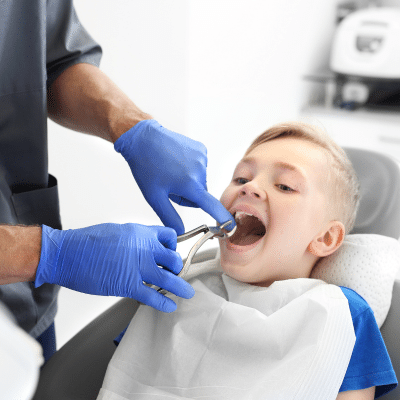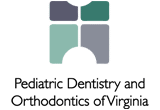 As parents, one of the greatest gifts we can give our children is a healthy, confident smile that lasts a lifetime. At Pediatric Dentistry and Orthodontics of Virginia in Midlothian and Colonial Heights, VA, we believe early orthodontic evaluation plays a crucial role in achieving this goal. While many parents think orthodontic treatment begins only in the teenage years, the truth is that an early evaluation can help identify potential dental problems before they become more serious — and often easier to treat.
As parents, one of the greatest gifts we can give our children is a healthy, confident smile that lasts a lifetime. At Pediatric Dentistry and Orthodontics of Virginia in Midlothian and Colonial Heights, VA, we believe early orthodontic evaluation plays a crucial role in achieving this goal. While many parents think orthodontic treatment begins only in the teenage years, the truth is that an early evaluation can help identify potential dental problems before they become more serious — and often easier to treat.
The American Association of Orthodontists recommends that every child have their first early orthodontic evaluation by age 7. At this stage, your child’s permanent teeth are beginning to come in, and an orthodontist can assess how their bite is developing and identify issues that might benefit from early intervention.
Here, we’ll discuss important signs to watch for and why an early evaluation is so beneficial for your child’s oral health and overall well-being.
Why Early Orthodontic Evaluation Matters
An early orthodontic evaluation allows us to detect developing problems with your child’s teeth, jaw alignment and bite before they worsen. When caught early, orthodontic treatment can be less invasive, shorter in duration and more effective at guiding proper growth.
Some benefits of an early orthodontic evaluation and care include:
- Preventing more severe problems: Early treatment can stop issues like crowding, crossbites, or jaw misalignment from progressing.
- Reducing the need for extractions: By guiding jaw growth and tooth eruption, we may avoid removing permanent teeth later.
- Improving speech and chewing function: Proper bite alignment helps with speaking clearly and chewing efficiently.
- Boosting self-esteem: Correcting dental issues early can improve your child’s confidence and social experiences.
How to Tell If Your Child Needs an Early Orthodontic Evaluation
It’s important for parents to observe their child’s dental development and know when to seek orthodontic advice. Here are key signs that your child may benefit from an early orthodontic evaluation:
Early or Late Loss of Baby Teeth
If your child loses baby teeth much earlier or later than typical, it can affect the spacing and eruption of permanent teeth. Premature loss may cause surrounding teeth to shift, leading to crowding. Late loss can delay the arrival of permanent teeth and cause alignment issues.
Difficulty Chewing or Biting
If your child complains about difficulty biting into food or chewing, or if their bite feels “off,” this could indicate a malocclusion (misaligned bite). Common bite issues include underbite, overbite, crossbite, or open bite.
Mouth Breathing or Snoring
Chronic mouth breathing or snoring can signal airway or jaw development problems that affect oral health. These conditions may contribute to misaligned teeth or jaw growth and should be evaluated through an early evaluation.
Thumb Sucking or Prolonged Pacifier Use
Habits like thumb sucking or using a pacifier beyond age 3 can put pressure on your child’s developing teeth and jaw, potentially causing bite problems such as open bites or protruding front teeth.
Crowded, Overlapping, or Spaced Teeth
Visible crowding or gaps between teeth, especially as permanent teeth emerge, often indicate that the jaws may not be growing in proportion to the teeth. This can lead to difficulty cleaning teeth and increase the risk of cavities.
Jaw Clicking, Popping, or Pain
If your child experiences jaw discomfort, clicking, or popping sounds when opening and closing their mouth, it could be a sign of temporomandibular joint (TMJ) issues or jaw misalignment requiring orthodontic attention.
Speech Difficulties
Certain speech impediments or lisps can be related to misaligned teeth or jaw problems that interfere with tongue placement and movement. An early orthodontic evaluation can help identify if orthodontic treatment can assist.
Facial Asymmetry or Misaligned Jaw
If one side of your child’s face looks different from the other or their lower jaw appears shifted forward, backward, or off to one side, these can be signs of skeletal or jaw growth issues that warrant an early orthodontic evaluation.
What to Expect at an Early Orthodontic Evaluation
At Pediatric Dentistry and Orthodontics of Virginia, your child’s first early orthodontic evaluation is a comprehensive yet comfortable experience. Our orthodontist will:
- Examine your child’s teeth, bite and jaw development
- Review your child’s dental and medical history
- Take X-rays or digital images if necessary to assess the position of permanent teeth and jawbones
- Discuss any concerns or signs you’ve noticed
- Develop a personalized plan, whether it involves monitoring growth or starting early treatment
Early Treatment vs. Monitoring
Not all children need immediate orthodontic treatment after their first early orthodontic evaluation. Sometimes, the best approach is to monitor growth and development and intervene at the ideal time. Early treatment, called Phase 1 or interceptive orthodontics, is used when issues are already evident and could worsen without intervention.
Examples of early treatment include:
- Expanding a narrow upper jaw
- Correcting harmful habits like thumb sucking
- Addressing crossbites or severe crowding
- Guiding permanent teeth into better positions
Later, when most permanent teeth have come in, your child may require Phase 2 treatment — usually braces or clear aligners — to achieve the final results.
Partnering With You for a Healthy Smile: Request Your Consultation in Virginia Today
At Pediatric Dentistry and Orthodontics of Virginia in Midlothian and Colonial Heights, VA, we want you to feel empowered to protect your child’s oral health from an early age. If you notice any of the signs mentioned above or simply want peace of mind, schedule an early orthodontic evaluation with our caring team.
Early detection and treatment through an early orthodontic evaluation can make a lasting difference in your child’s smile, function and confidence. Request your child’s complimentary orthodontic consultation today to learn more about early orthodontic evaluation and how we can help your child grow into a healthy, happy smile!
